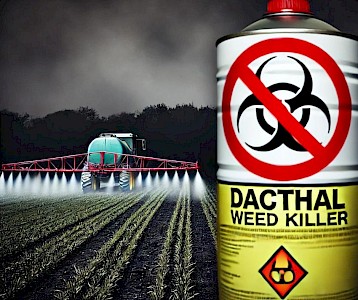Birth Defects from Exposure to Dacthal (DCPA) Pesticide

Locks Law Firm is accepting birth defect cases on behalf of children suffering from low birth weight, decreased IQ, and impaired brain development and motor skills due to exposure to the herbicide Dacthal (“DCPA” or “dimethyl tetrachloroterephthalate”).
The most at-risk individuals are the children of farmworkers whose pregnant mothers worked around crops treated with DCPA, such as bok choy, broccoli, brussels sprouts, cabbage, kale, and onions. The children of pregnant mothers who spent time around areas where DCPA was applied, including lawns, fields, or artificial turf, are also at risk.

On August 6, 2024, the United States Environmental Protection Agency (“EPA”) announced an emergency ban on DCPA, effective immediately, suspending its use or sale for any purpose. EPA found that unborn children of pregnant mothers exposed to DCPA can develop significant changes to fetal thyroid hormone levels, resulting in irreversible birth defects and developmental disorders, such as low birth weight, decreased IQ, and impaired brain development and motor skills.
“DCPA exposure represents a serious risk to pregnant workers and their children, so it’s imperative that we warn people about those risks now,” said Assistant Administrator for the Office of Chemical Safety and Pollution Prevention Michal Freedhoff. “We’re committed to taking action to protect the health of children, workers, and others who are exposed to DCPA.”
According to EPA, exposure to DCPA can occur long after its initial application, and the risks are much more significant than previously thought. DCPA product labels have stated that entry into a field treated with DCPA should be restricted for 12 hours, but new evidence shows that the DCPA levels in treated fields remain unsafe for up to 25 days or more. EPA also estimates that some pregnant individuals handling DCPA products could be subjected to exposures 4 to 20 times greater than what current DCPA product label instructions indicate is considered safe.
EPA is further considering health risks to individuals who did not even enter DCPA treated areas. Spray drifts from the use of DCPA–whereby droplets of the pesticide are carried through the air– may expose unborn children and pregnant individuals who live close to agricultural fields. In a 2009 study, investigators found traces of DCPA inside homes located over 1.5 miles from the nearest agricultural field. A 2019 study found more than 50 percent of adolescent girls living in agricultural communities in the Salinas Valley, CA had been exposed to DCPA, and the odds of detecting DCPA were 3.1 times greater if the study participant lived near a field.
This is the first time in over 40 years that EPA has used its emergency authority to immediately stop the use of a pesticide. But, the move is long overdue. 11 years ago, the agency first ordered AMVAC Chemical Corporation (“AMVAC”)–the sole manufacturer of DCPA–to turn over its relevant health hazard information, including data about the toxic effect of DCPA on fetal thyroid hormones.
The undue delay in protecting unborn children from DCPA may be the result of possible negligence by AMVAC, but also inherent flaws in the ability or inclination of EPA to ban pesticides that are harmful to humans or the environment. Evidence produced in herbicide litigations, such as the RoundUp litigation involving glyphosate, has shown that EPA often bases its regulatory decisions on science developed by the pesticide manufacturers, slows the release of toxicology studies, and cherry-picks or buries safety data.
We all stand to lose if we do not act to minimize or eliminate the health risks of pesticides.
Locks Law Firm is investigating cases involving individuals who have lived around or worked in areas treated with DCPA and whose children were born with birth defects or developmental disorders. Contact us if you believe you or someone you know may have been affected by DCPA.
Sources
EPA Issues Emergency Order to Stop Use of Pesticide Dacthal to Address Serious Health Risk, United States Enivornmental Protection Agency (Aug. 6, 2024), https://www.epa.gov/newsreleases/epa-issues-emergency-order-stop-use-pesticide-dacthal-address-serious-health-risk-4
Pesticides; Emergency Order Suspending the Registrations of All Pesticide Products Containing Dimethyl Tetrachloroterephthalate (DCPA), 89 Fed. Reg. 64445-64458 (Aug. 7, 2024), https://www.federalregister.gov/documents/2024/08/07/2024-17431/pesticides-emergency-order-suspending-the-registrations-of-all-pesticide-products-containing
Harley KG, Parra KL, Camacho J, Bradman A, Nolan JES, Lessard C, Anderson KA, Poutasse CM, Scott RP, Lazaro G, Cardoso E, Gallardo D, Gunier RB. Determinants of pesticide concentrations in silicone wristbands worn by Latina adolescent girls in a California farmworker community: The COSECHA youth participatory action study. Sci Total Environ. 2019 Feb 20;652:1022-1029. doi: 10.1016/j.scitotenv.2018.10.276. Epub 2018 Oct 23. PMID: 30380470; PMCID: PMC6309742.
Harnly ME, Bradman A, Nishioka M, McKone TE, Smith D, McLaughlin R, Kavanagh-Baird G, Castorina R, Eskenazi B, Pesticides in dust from homes in an agricultural area. Environ Sci Technol. 2009 Dec 1;43(23):8767-74. doi: 10.1021/es9020958. PMID: 19943644.
Lerner, Sharon, The Department of Yes, How Pesticide Companies Corrupted the EPA and Poisoned America, The Intercept (June 30, 2021), https://theintercept.com/2021/06/30/epa-pesticides-exposure-opp/
Do I have a case? Free Case EvaluationLocks Law Firm only provides legal advice after having entered into an attorney client relationship, which our website specifically does not create. Conversations that originate from website messaging, chat or other two way web based engagement do not create an attorney client relationship. It is imperative that any action taken be done on the advice of counsel. Because every case is different, the description of awards and cases previously handled do not guarantee a similar outcome in current or future cases. The firm practices law in Pennsylvania, New Jersey & New York as Locks Law Firm. Super Lawyers, Best Lawyers in America and other organizations that rate attorneys are not designations that have been approved by the State Supreme Courts or the American Bar Association.






